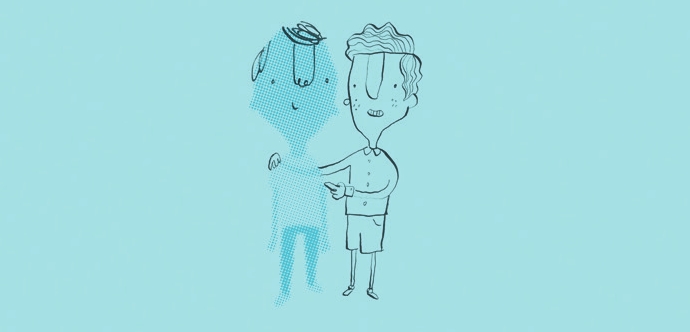Eion Colfer: “If Teachers Get 10 Minutes To Catch Their Breath, They’re Doing Well”

Helping his actress mother learn her lines taught Eoin Colfer about drama, dialogue, and how to spot truly great writing…

- by Eoin Colfer

My earliest memories of books involve going down to the local library as a very young boy with my brother – we’d sit on the carpet in front of the ‘children’s section’ (which was just one set of shelves) and stay there for a couple of hours while our dad was at the back, browsing the reference section. That was where we learnt to love reading; a love that’s stayed with me my whole life.
I’m one of five boys, and all of us could read before we started school – our parents were very proactive in that area. I remember looking around the classroom on my first day and thinking to myself, in a most superior manner, ‘These children know nothing! I must be a genius!’ I was disgusted; I thought I’d be getting proper books, and there was this teacher, writing the alphabet on the board, for goodness’ sake. She was great, though. Her name was Miss Franey, and she’d give me – and a couple of the other kids who were also early readers – books she thought we’d enjoy. She was in a car crash that year, and had her arm in a splint for a long while; that was 46 years ago, and I still remember her clearly. It was lucky for both of us, I think, that I was really bad at maths – otherwise I might have been unbearable.
I always had access to books and literature at home. Our parents were quite liberal for the 1970s – dad was a teacher and artist, and mum was an actress and taught drama. From the age of six or seven, I used to help mum learn her lines, reading all the other parts for the scenes she was in. I loved those times; they were really special – like a secret we shared between us. It must have given me an early feel for dialogue and drama, and I also quickly developed a sense of discernment, identifying who the good writers were. Thinking about it, it was a very cultured way to teach someone how to read – and it was very directly responsible for me becoming a writer, too; the first things I wrote were plays.
When I was teaching, I was lucky enough to work under a very enlightened principal, Mr Goff. He gave me a lot of leeway, so I was able to establish a regular reading time, of 30 minutes every day. That really wasn’t how the curriculum was set up at the time, and I know some people didn’t approve, but I was supported all the way. I didn’t read my own work – that really might have set me up for a moment of hubris – but I was able to share books and authors I loved, like Roald Dahl, with my pupils. I’d start off reading a bit, and acting it out; then one of the kids would take over – and so on, until the last ten minutes or so, when I’d encourage everyone to read by themselves. It was great to see how it got them interested.
I think it’s hard for teachers to do that sort of thing these days. Books are expensive, for a start, and you need thirty copies for a class novel. And then there’s the question of time – with so much to get through, if you get ten minutes to catch your breath you’re doing well. Fitting ‘reading for pleasure’ into a day when you already have to cover more and more it seems, year on year, is a huge challenge, and I’m always impressed when schools manage it.
I have two boys of my own now. My older son, Finn, isn’t much of a reader at the moment, although he used to enjoy being read to. When my dad was alive, Finn used to sit on his knee while he told him stories; he adored that, but since dad died, that love of stories hasn’t translated into books, which I’m kind of upset about, because being a reader is so helpful for life in all kinds of situations. His younger brother, Sean, is a sucker for toilet humour – he loves the Wimpy Kid books, and was a Captain Underpants fan when he was younger. When Jeff Kinney was in Dublin, he came to see us – I think that was the moment my kids suddenly realised that having a writer as a dad could have its advantages!
Imaginary Fred, a collaboration with Oliver Jeffers, is my first go at writing for a very young audience; although it would be more accurate to describe it as a picture book for all ages, really. It has a sort of nostalgic look about it, so I hope that parents might pick it up, feel that connection to their own childhoods, and read it to their four or five year olds – who might then come back to it at six and read it for themselves, bringing a new perspective every time.










